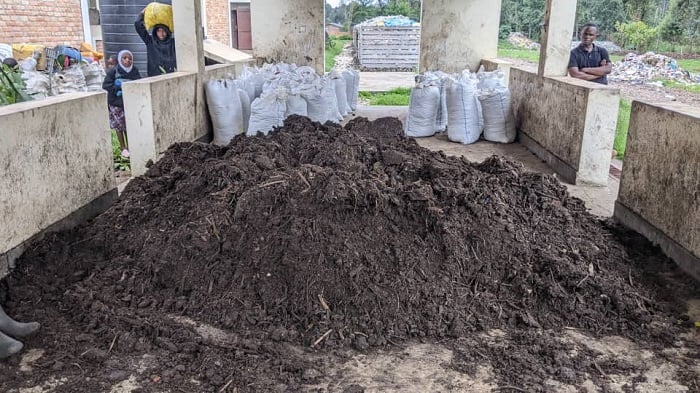1000 Musanze families receive 8 Tons of fertilizer to boost fruit Production
On Saturday, November 2, 2024, 1000 families in Busogo Sector received 8 tons of premium organic fertilizer to support agricultural growth.
Eva Christine Uwamariya, Director of Recycl’Africa, a waste management organization focused on environmental conservation, led the initiative.
Alongside the distribution of fruit trees and fertilizer, she emphasized that this program aims to revitalize both agriculture and soil health across the region.
She explained that high-quality organic fertilizer nurtures the soil, enabling farmers to produce nutritious and sustainable crops.
“This is a bi-annual effort to support malnutrition prevention and environmental preservation. These fruit trees will help prevent soil erosion, and address malnutrition and environmental degradation—pressing issues for Rwandan communities.
We believe everyone should actively contribute to tackling these challenges,” Uwamariya stated.
“We’ve provided these trees for the families to plant, but they must not neglect them. Instead, they should nurture them until maturity, ensuring a bountiful harvest that will improve family wellbeing.”
With the organic fertilizer, families are encouraged to enhance their agricultural practices, producing nutrient-rich crops for both consumption and income. Within two to three years, the fruit trees will start yielding, offering a sustainable source of food and economic benefit.
Local authorities plan to monitor each household’s progress, ensuring proper care of the trees and optimal use of the fertilizer.
These families have also given fruits trees
These families from Busogo Sector in have started planting avocado trees in their homesteads, with expectations that within the next two years, they will begin harvesting ripe avocados. This initiative is aimed not only at enhancing environmental conservation but also at improving air quality.
The avocados produced are expected to provide food security for these families, helping to combat malnutrition and enabling surplus production for local markets.
The seedlings were distributed to these families on Saturday, November 2, 2024, aligning with the fact that many already understood the health benefits of avocados in combating malnutrition and preventing disease. However, they lacked the resources or the motivation to buy even a single seedling to plant for themselves.
Augustin Maniraguha explains: “Avocados are rich in nutrients that are essential for our health. Adding them to our meals brings joy to our dining experience, and for young children, they promote healthy growth and cognitive development. However, we’ve faced challenges in consuming them regularly, sometimes going months without, as purchasing them is costly.”
“A single avocado here costs between 100 and 300 Rwandan Francs. For a family of five or more, you’d need at least five avocados daily, making it an expensive option. Not only is it costly, but we also lacked the initiative to plant a tree, often due to a lack of awareness or appreciation. We’re grateful to the benefactors who provided these seedlings for free, along with the knowledge on how to care for them until they grow, bear fruit, and continue to thrive.”
For some, these trees are seen as a potential income source; apart from family consumption, they could also sell the surplus at local markets.
Joseph Basomingera shares his excitement: “A well-grown tree can yield between 200 to 400 avocados. When you calculate at the current price of around 200 Rwandan Francs each, that’s a solid income source, enough for health insurance, school fees, or even school supplies. My commitment is to nurture this tree so it grows and produces enough for both food and additional income.”
The beneficiaries believe that these trees will offer various benefits: providing nutritious fruit, purifying the air through their leaves, stabilizing the soil to prevent erosion, and even attracting rainfall.

